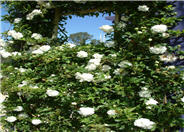
Common name:Hybrid Tea Rose (selections)
Botanical name:Rosa Hybrid Tea varieties
These shrubs and vines are the most loved in the Western USA and are very resilient. They come in a wide variety of sizes and colors and are easy to maintain with proper care. They can be used in a water-conserving garden with careful attention to irrigation practices.

Common name:Olive, Edible Olive
Botanical name:Olea europaea
This broad tree will slowly grow to 20'-30' tall and wide. It has small, grey-green, evergreen leaves. Small white fragrant flowers bloom in spring, followed by fleshy black fruit that appears in fall. Fruit is messy and can stain sidewalks. There are cultivars that do not produce fruit. Some folks are allergic to the blooms. This tree is very long lived, with a beautiful gnarled trunk. It prefers full sun and low watering in summer months (twice a month) and none during the winter, when established.

Common name:Climbing Rose
Botanical name:Rosa Climbing varieties
With its dark green foliage and fragrant flowers with full and double blooms, this upright shrub is generally grown as a vine or pillar rose. Climbing varieties come in many colors.

Common name:Crimson Queen Japanese Maple
Botanical name:Acer palmatum 'Crimson Queen'
This mounding plant has finely dissected foliage that retains its red color during the summer.
More than half of the water used at your home is for outside purposes. Studies show that on average, half of the water used outdoors is wasted. The leading cause of waste is incorrectly set and poorly managed irrigation controllers. The second biggest cause of wastage is broken irrigation equipment that goes undetected. There are a few basic things you can do to make a big difference in your water use.
Click in the green box for more information
Designer: Jeff Gamboni Landscape Archite
Photographer: GardenSoft
Practice grass-cycling by leaving short grass clippings on lawns after mowing, so that nutrients and organic matter are returned to the soil.
Drip and other smart irrigation delivers water directly to roots, allowing no excess water for weeds.